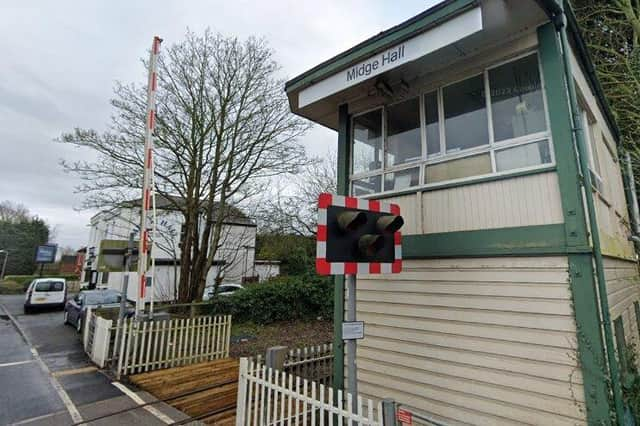Future of defunct Midge Hall station 'in the hands of locals', government minister suggests


Huw Merriman was speaking in the Commons in response to a debate secured by South Ribble MP Katherine Fletcher on the subject of reinstating the defunct boarding point, which closed more than 60 years ago.
His comments came just over 24 hours after a Lancashire County Council meeting heard the authority was still awaiting guidance about the type of projects that will be eligible for finance under the Local Transport Fund (LTF).
Advertisement
Hide AdAdvertisement
Hide AdIt emerged earlier this year that the county council area is in line for £494m from that pot - more than any of the 27 local authorities across the North and Midlands that have been allocated shares from the fund, which will be delivered between 2025 and 2032.
The cash is intended to reduce congestion and improve public transport in smaller cities, towns and rural areas.
In a parliamentary debate on Wednesday, Mr. Merriman said the government would “shortly publish advice for local authorities to help them make the most of this opportunity”.
However, he stressed that when it came to specific projects like reopening Midge Hall - along with removing the buffers on the line at Ormskirk, which was also being promoted by Ms. Fletcher - it would be for County Hall to determine whether the schemes were “prioritised for investment”.
Advertisement
Hide AdAdvertisement
Hide AdThe minister said he was happy to “help sell the case” that had been made for the two schemes, as well as another vision outlined during the discussion - the reopening of the so-called ‘Burscough Curves’ in order to reconnect the Southport-to-Manchester railway line with the track running between Preston and Ormskirk.
Asked directly by Ms. Fletcher about whether he would consider carrying out a “feasibility study” into bringing Midge Hall back into use, Mr. Merriman said the new fund could be used to finance such business cases.
On Tuesday, at a meeting of Lancashire County Council’s scrutiny management board, the authority's lead member for highways and active travel, Scott Smith, said that until the promised guidance on the LTF had been received, it would be “silly to try and progress things that may ultimately not be able to be progressed”.
He was answering a question from committee member - and Burnley Central West division representative - Scott Cunliffe who had sought “clarity” for residents about the type of projects that might be delivered via the fund.
WHAT’S THE BIG IDEA?
Advertisement
Hide AdAdvertisement
Hide AdAlthough Midge Hall station closed in the early 1960s, trains still stop there as they pass through. That is because the line is a single track at that point, so – as a safety measure – the driver has to exchange a token at Midge Hall, then travel through to Rufford and hand the token back.
Katherine Fletcher told the Commons debate the situation meant passengers ”can see a platform, but cannot get on or off”.
She said that housing development, including on the former Leyland Test track, would ultimately lead to another 2,000 people living “within a very short walk of Midge Hall station”.
Ms. Fletcher added that the removal of the buffers at Ormskirk - together with the reopening of Midge Hall - would enable the Preston-to-Liverpool train service via Rufford to “zing even more”.
Advertisement
Hide AdAdvertisement
Hide Ad“Anybody using the line from stations in my patch—from Croston or Rufford, for example — who wants to go to Liverpool gets the train to Ormskirk, stops, gets out, toddles down the platform, past the set of buffers, waits for the Merseyrail train to come, then gets on that and continues their journey to Liverpool,” she explained.
She said the buffers were “purely administrative” to demarcate boundaries.
Comment Guidelines
National World encourages reader discussion on our stories. User feedback, insights and back-and-forth exchanges add a rich layer of context to reporting. Please review our Community Guidelines before commenting.